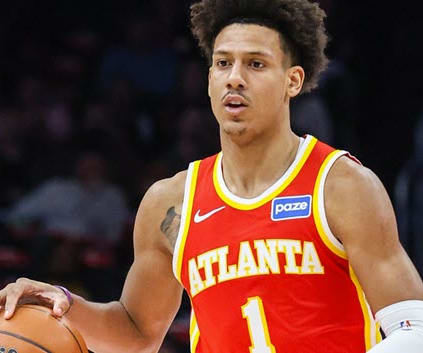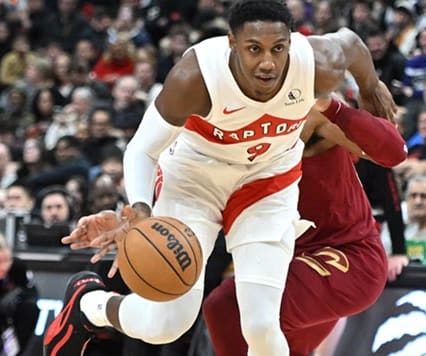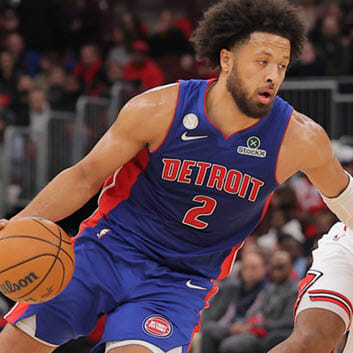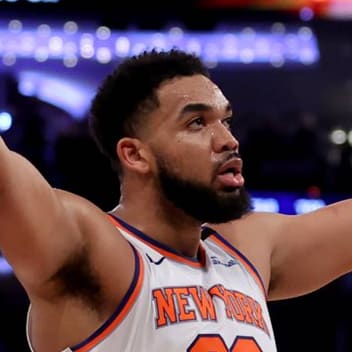2025 Stats
PTS
19.8
REB
11.8
AST
2.8
STL
0.9
BLK
0.6
ROS Projections
2025 Fantasy Outlook
Towns' first season with the Knicks was excellent. Moving back to the center position after playing power forward next to Rudy Gobert, Towns upped his rebounding production back to double digits (12.8 RPG). The rest of his game remained fairly steady, with 24.4 points and 2.0 made threes on 53/42/83 shooting, 3.1 assists, 1.0 steals and 0.7 blocks in 35.0 minutes. He re-established himself as a first-round value in fantasy. New York has a new head coach in Mike Brown, but that isn't expected to shift KAT's role significantly, unless the decision is made to move him back to power forward. More likely, Towns will see a slight reduction in minutes. Heading into his age-30 season, Towns is one of the best fantasy options available at the center position, except for the fact that he doesn't block many shots. Read Past Outlooks
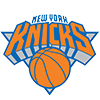
Double-doubles in win
Towns notched 12 points (5-9 FG, 0-1 3Pt, 2-3 FT), 14 rebounds, one assist and one steal in 28 minutes during Sunday's 114-89 win over the Spurs.
ANALYSIS
The Knicks handled business early, resulting in a lower workload for Towns. Despite this dud, Towns has been very solid in recent games. Over his last six appearances, he's producing top-25 value in nine-category fantasy formats with 19.5 points, 10.5 rebounds, 1.8 assists, 1.2 steals and 1.8 three-pointers.
The Knicks handled business early, resulting in a lower workload for Towns. Despite this dud, Towns has been very solid in recent games. Over his last six appearances, he's producing top-25 value in nine-category fantasy formats with 19.5 points, 10.5 rebounds, 1.8 assists, 1.2 steals and 1.8 three-pointers.
NBA Per Game Stats
Per Game
Total
Per 36
NBA Per Game Stats
Loading Per Game Stats...
2025 NBA Game Log
2025
2024
2023
2022
2021
2020
2019
2018
2017
2016
2025 NBA Per Game Split Stats
Schedule
By Month
Starting/Off Bench
Days Rest
Vs Opp
By Result
2025 NBA Per Game Split Stats
Loading Split Stats...
Advanced Stats
Loading Advanced Stats...
Stat Review
2025
2024
2023
2022
2021
2020
2019
2018
2017
2016
How does Karl-Anthony Towns compare to other players?
This section compares his stats with all players from the previous three seasons (minimum 200 minutes played)*. The bar represents the player's percentile rank. For example, if the bar is halfway across, then the player falls into the 50th percentile for that stat and it would be considered average.
True Shooting %
60.4%
Effective Field Goal %
53.7%
3-Point Attempt Rate
31.2%
Free Throw Rate
41.3%
Offensive Rebound %
10.7%
Defensive Rebound %
31.0%
Total Rebound %
20.7%
Assist %
13.6%
Steal %
1.3%
Block %
1.9%
Turnover %
11.7%
Usage %
25.8%
Fantasy Points Per Game
40.1
Fantasy Points Per Minute
1.3
NBA Historical Fantasy Stats
Historical ADP
Loading Historical ADP...
Knicks Depth Chart
Our full team depth charts are reserved for RotoWire subscribers.
Subscribe Now
Knicks Rotation: Minutes Breakdown
Loading Knicks Rotation Data...
Average Fantasy Points
Minutes
FanDuel
DraftKings
Yahoo
FantasyDraft
Head2Head
Sorare
Average Fantasy Points are determined when Karl-Anthony Towns was active vs. non-active during the season. Click here to view average fantasy points for a different time period.
Loading Average Minutes...
Past Fantasy Outlooks
2024
2023
2022
2021
2020
2019
2018
2017
2016
2015
In 2023-24, Towns made at least two three-pointers per game for a fourth straight season and shot over 40 percent from deep for the fifth time in his career. It was a solid bounce-back season for the talented big man after he played in a career-low 29 games the year prior. However, after finishing inside the top 10 in eight-category leagues in each of his first four campaigns, Towns has finished inside the top 25 only once over the past five seasons, including a 47th-place finish last year. However, Towns' outlook looks different after a surprising trade to New York right before training camp. With Isaiah Hartenstein in OKC and Mitchell Robinson nursing another injury, Towns will be the Knicks' starting center. When Towns was an elite fantasy producer, he was primarily a center and under the tutelage of Tom Thibodeau, so the move is intriguing. From 2016-2019, when Thibodeau was the Timberwolves' head coach, Towns averaged 24.3 points, 12.0 rebounds and 1.4 blocks with 53/40/84 shooting splits. Nonetheless, Jalen Brunson remains the Knicks' top offensive option, while Mikal Bridges, OG Anunoby and Josh Hart will also play heavy minutes and rack up stats quickly. Towns returning to elite fantasy production isn't guaranteed, but he's in a better position than the past two campaigns.
More Fantasy News

Back in double-double column
Towns contributed 28 points (10-17 FG, 5-9 3Pt, 3-4 FT), 11 rebounds, two assists and three steals across 32 minutes during Sunday's 105-99 win over Chicago.
ANALYSIS
Subscribe now to instantly reveal our take on this news.
Subscribe now to instantly reveal our take on this news.

Logs 25 points in narrow win
Towns contributed 25 points (10-15 FG, 3-3 3Pt, 2-2 FT), seven rebounds, one assist and one steal over 34 minutes during Saturday's 108-106 victory over Houston.
ANALYSIS
Subscribe now to instantly reveal our take on this news.
Subscribe now to instantly reveal our take on this news.

Posts double-double vs. Detroit
Towns registered 21 points (7-14 FG, 1-4 3Pt, 6-6 FT), 11 rebounds, four assists and one steal over 31 minutes during the Knicks' 126-111 loss to the Pistons on Thursday.
ANALYSIS
Subscribe now to instantly reveal our take on this news.
Subscribe now to instantly reveal our take on this news.

Wins Shooting Stars event
Towns and Team Knicks defeated Team Cameron in the final round of the 2026 NBA All-Star Shooting Stars event Saturday.
ANALYSIS
Subscribe now to instantly reveal our take on this news.
Subscribe now to instantly reveal our take on this news.

Tallies another double-double
Towns supplied 21 points (8-13 FG, 1-1 3Pt, 4-4 FT), 11 rebounds, five assists, one block and one steal over 26 minutes during Wednesday's 138-89 win over the 76ers.
ANALYSIS
Subscribe now to instantly reveal our take on this news.
Subscribe now to instantly reveal our take on this news.
Latest Fantasy Rumors

Will represent World Team in ASG
Towns will play for the World Team in the 2026 NBA All-Star Game, the NBA announced Tuesday.
ANALYSIS
The NBA will debut a new format for the 2026 All-Star Game, and Towns will be part of the World Team, where he'll play alongside the likes of Luka Doncic, Giannis Antetokounmpo, Nikola Jokic and Victor Wembanyama, just to name a few. This is Towns' sixth All-Star nod of his career.
The NBA will debut a new format for the 2026 All-Star Game, and Towns will be part of the World Team, where he'll play alongside the likes of Luka Doncic, Giannis Antetokounmpo, Nikola Jokic and Victor Wembanyama, just to name a few. This is Towns' sixth All-Star nod of his career.



